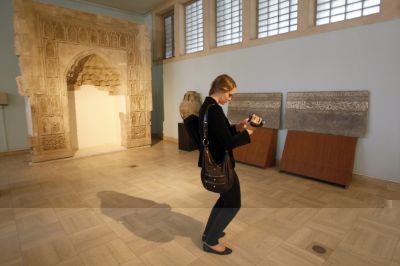Google to digitise Iraq Museum archives: CEO

US Internet giant Google will soon begin digitising artefacts and documents at Iraq's National Museum, its chief executive said in Baghdad on Tuesday.
Eric Schmidt, on the last day of a three-day tour of the country, told reporters that some 14,000 digital images taken at the museum would be freely available online from the beginning of next year.
"Google's mission all over the world is to make information available to everyone," he said. "There's a tremendous amount of information in the Arab world that is neither understood nor broadly available to everyone else."
He added: "More than 14,000 images that we've taken, plus a few surprises, will be available to everyone in the world, early next year."
"With the support of the Iraqi government and the Iraqi people, this museum will open, over time, to the world."
The museum once held one of the world's most impressive Mesopotamian collections, but around 15,000 statues and valuable artefacts were looted when it was ransacked in April 2003 after the US-led invasion of Iraq.
Vandals smashed numerous antiquities and beheaded statues, while professional thieves selected valuable items for smuggling.
While most of the returned items have come from neighbouring Jordan, several traveled from Syria and the United States and others from as far afield as Peru and Sweden.
The project involves digitising and electronically cataloguing artefacts at the museum, with the costs, not immediately released, being borne jointly by Google and the US State Department.
Asked if the Internet search giant was planning any other projects in Iraq, Schmidt replied: "We've started with this one, I'm sure we'll add more."
Access to the Internet is extremely limited in Iraq, with the vast majority of web-surfers using satellite dishes, which are very expensive. Prices are expected to drop dramatically in the coming years as a Doha-based firm establishes a fibre optic cable landing in the county, due by 2011.
Google's work is a sign of improving security in Iraq, which has been pushing for foreign investment in the wake of the invasion as it seeks to rebuild its moribund economy and dated infrastructure.
Despite investment conferences in Washington, London and Berlin in recent months, there have been no major deals signed with foreign companies outside of the oil sector, something Schmidt said Google hoped to change.
"Most American companies are not yet operating in Iraq, and we would like to show that it's possible to do business in Iraq, that Iraq is an important market that will grow quickly, that it's sufficiently stable that you can begin your business operations here and that it's a safe place to be," he said.
Travelling with Schmidt were Donald Dixon, the managing director of venture capital firm Trident Capital, and retired US general Peter Pace, a former chairman of the joint chiefs of staff.
Pace, who joined the group at Schmidt's invitation, said he was encouraged by progress made in Iraq since he last visited the country in 2007, before he retired from the military.
But he called on the Iraqi government to invite more businesspeople to the country and not rely on embassies to organise tours.
"It's one thing for US businessmen to come at the invitation of the embassy, and it's another thing for the Iraqi government to invite them to come here," he told AFP.
Subscribe to Independent Premium to bookmark this article
Want to bookmark your favourite articles and stories to read or reference later? Start your Independent Premium subscription today.

Join our commenting forum
Join thought-provoking conversations, follow other Independent readers and see their replies